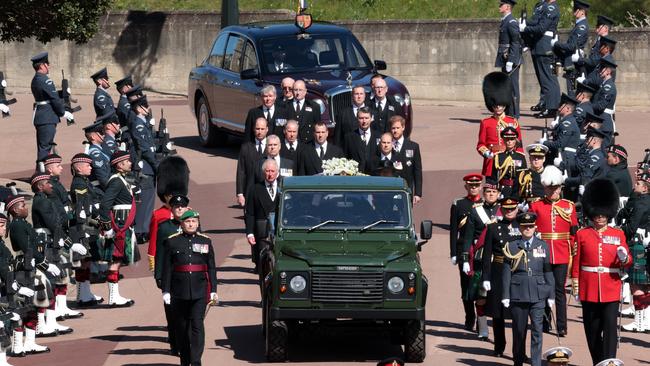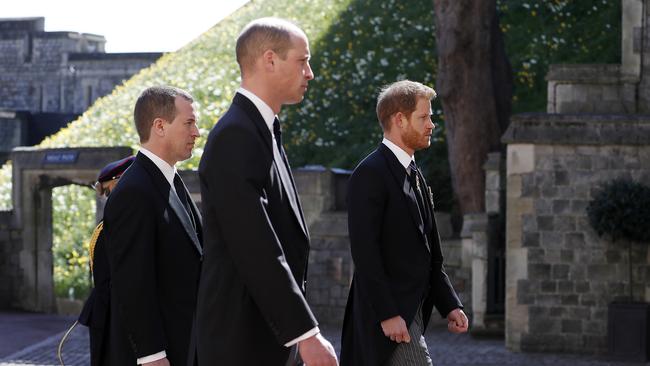The online war nothing could prepare me for
One sentence was all it took. After social media trolls took objection to my dispatch from the royal funeral, a campaign of abuse swamped me.

Last week I was filling in a form for a hostile environment course, something I have to attend every three years for my job as a war correspondent.
“Have you experienced any particularly stress-related incidents?” it asked.
“Kidnaps, ambush, bombs ...” I wrote.
“You left out being shot at,” my husband laughed.
“And something else,” I replied. Neither of us laughed.
For two months I have rarely slept more than three hours a night. I check all the locks when I go to bed and worry if I don’t hear from my student son each day. I cut short a romantic dinner with my husband because I thought a woman on the next table was staring at me.
None of this is because of traumatic experiences in wars but the consequence of a trip to Windsor on a sunny Saturday to cover the Duke of Edinburgh’s funeral.
This is what online abuse does. We’ve all heard about it and maybe like me you dismissed it as “just words”.
Perhaps you read the essay posted online last week by the Nigerian author Chimamanda Ngozi Adichie. In it she explained how two young female writers she had encouraged whipped up a social-media storm after a 2017 Channel 4 interview in which Adichie said she believed “transwomen are transwomen”.
Her protegees had responded by going online to call her a murderer, tell Adichie that her parents’ deaths were “punishment for her transphobia” and accuse her of sabotaging their careers
“In this age of social media, where a story travels the world in minutes, silence sometimes means that other people can hijack your story and soon, their false version becomes the defining story about you,” she wrote. “The assumption of good faith is dead. What matters is not goodness but the appearance of goodness. We are no longer human beings. We are now angels jostling to out-angel one another.” Like her, I wonder what is happening to our society that people think it’s OK to post death threats and vitriol to a person and their family in response to words written as a deadline approached.
The worst week of my professional life started with a text from my editor asking me to cover the duke’s funeral. She was persuasive, it seemed a moment in our history and I knew my mum would be impressed, so I agreed.
Everything went wrong that day. I’d booked a room at a guesthouse in Windsor thinking it would make my life easier, only for the fire alarm to go off halfway through the funeral. By the time it was sorted out I’d missed half the ceremony and had only an hour to write 1,500 words. Finally I sat down at my desk and started writing, opening with the moving image of the black-masked queen alone in the chapel. Wanting to contrast the duke as her great love to the old man who had become a figure of fun to many of us, I wrote the line that would cause all the problems: “To her subjects, Prince Philip was the longest-serving royal consort in British history — an often crotchety figure, offending people with gaffes about slitty eyes, even if secretly we rather enjoyed them.”
With deadline approaching, I filed my copy, which would appear on the front page after going through a series of editors — all of whom read the line how I intended it to be read, or didn’t notice.
The next day, I had arranged to take my mum for lunch out, a rare break from caring for my disabled father. On the way, I noticed some activity on Twitter, accusing me of being racist. I was confused. I have always felt it better not to engage as it just fuels the mob, so I tried to ignore it. Only later, after I had dropped Mum back home, did I realise how many had read the sentence in a different way to what I intended. I had meant to say that we laughed at the duke’s lack of diplomacy, not his racist comments. Indeed I had described his remarks as “offending”. However I could see their point. I was mortified.

As a female journalist I am sadly used to online abuse, from jihadists who hate western women, or Pakistani hardliners because of my association with the activist Malala Yousafzai, whose autobiography I worked on. This was different. People apparently thought it was a perfectly reasonable response to abuse me, my husband and son. The jihadists were polite in comparison.
My most recent tweet had been a photo of two glasses on a balcony overlooking the Thames. We were celebrating the pubs reopening on my husband’s birthday. That was seized on over and over by people accusing me of getting drunk by the river in Windsor while the funeral was on and “raising a glass to Phil the Greek at the Racist Arms”. That the post was from London three days earlier was apparently irrelevant. To them, as they told me, I was a “f***ing big-nosed racist wine-drinking c***”.
Then there were the death threats: “Don’t walk around if I see you or your family I’ll knock you out and so ur family,” said dubstepbystep on my Instagram. Telling me I should be killed was the least of it.
“I feel sorry for your children. You f***ing racist old hag, washed up trowel-faced old bitch,” wrote Maddie Rainer.
Howard Wong, who runs an ice-cream company called Little Moons, thought it perfectly acceptable to track down my husband’s account and post abuse about his “racist wife”.
My Wikipedia page was repeatedly hacked, changing my description from bestselling author to “racist bigot”. One man on social media offered tips on how to start a concerted campaign against me.
Many of my abusers had only a handful of followers or were clearly bots. Disturbingly many were women. Instagram was even worse than Twitter.
Some people were lovely, tweeting in support (which I will never forget) but being rewarded by abuse themselves. Many, including people from Asia, sent me supportive messages. Others were silent, including young colleagues I have helped and writers claiming to stand for free speech, presumably scared that they would be tarred with the racism brush. One of my oldest friends asked me: “Why would you write such a thing?” as if I had done it deliberately.
I stopped looking at the messages. My husband went through them, reporting threats to Twitter, some of which were taken off, blocking other senders to try to protect me. He was left shaking.
Over my 33-year career I have taken on despots and dictators; now my nemesis was a fashion blogger called Susie Bubble, who runs a bubble-tea cafe in Stoke Newington, north London.
She launched a petition demanding an apology from me and The Sunday Times - even though the paper published an apology as soon as it could and I had apologised to anyone who wrote to me directly. There was no excuse for what I had written, I told people over and over again. At a speaking event the Tuesday after the funeral, I apologised at length. I posted the apology on my public Facebook page.
Bubbles’ organisation, the ESEA (East and Southeast Asia) Sisters, published all my social media handles. They contacted every organisation I have ever worked with - charities I am on the board of, publishers of my books, awards I am up for or have won, American think tanks I am affiliated with, places where I was due to speak. They posted malicious reviews on Amazon. They even contacted my college at Oxford demanding I be stripped of my honorary fellowship.
The actress Gemma Chan, whose film Crazy Rich Asians I had enjoyed, demanded that people sign the petition. This took it across the Atlantic where many of her followers seemed to think that it was me who coined the term “slitty eyes”.
The New York Public Library, where I was shortlisted for the Bernstein award for excellence in journalism, decided not to award the prize. Their letter to my publisher ended: “The award honours the noble profession of journalism, and is a reflection on The New York Public Library and its values. As such, we need to hold the candidates to the highest possible standards.” The Washington-based International Women’s Media Foundation, which now has a whole online media abuse department because of so many attacks, warned me to watch for identity theft and alert my bank. I was paranoid when, a few days later, a credit card stopped working.

For three weeks it took over our lives. Police came to question us and are keen to prosecute for malicious communication. We have to decide whether we want to go to court and stir this all up.
Every day I hear of professors, female politicians, lawyers, comedians and writers being abused or cancelled, or feeling they can no longer express opinions for fear of such a response. Many contacted me but did not want to speak out for fear of provoking more abuse.
I had read about cases such as that of the long-time New York Times health editor Donald McNeil, 67, forced out of his job this spring for repeating — not using out of malice — the n-word at a dinner for students on a holiday in Peru two years ago. He was part of a team that won the Pulitzer for coverage of the pandemic.
Adam Habib, 56, director of London’s School of Oriental and African Studies, was attacked and suspended for using the same word in response to a question after years of work promoting racial equality in his home country, South Africa. He has now been reinstated.
Neil Thin, 60, an anthropology lecturer at Edinburgh University, was attacked online for racism, misogyny and transphobia after he criticised a move last year to change the philosophy building’s name from David Hume Tower, named after the 18th-century philosopher who is now accused of links to slavery.
Thin had also raised concerns about a 2019 campus event called Resisting Whiteness, featuring an area exclusively for people of colour, which he branded “segregation”. Not only was he accused of being a “rape apologist”, but students circulated a letter saying they did not feel safe in his classes.
“They have destroyed my reputation, damaged my health and put a huge toll on my family,” he says. “I should be able to brush it off but the power of social media is to make you doubt what matters ... I’ve been beaten up badly three times in my life but this hurt an awful lot more.”
Thin faced a two-month investigation that exonerated him. His accusers faced nothing. Thin says he cannot go back into teaching until those who tried to destroy his reputation are investigated.
“The message the university is sending out is that the students can do exactly what they like and we are too scared to challenge them,” he said. “That’s a terrible way of educating students.”
The husband of one of two women who accused the former Scottish first minister Alex Salmond of sex abuse spoke to the Daily Record of the trolling she faced. “It felt like watching my wife self-harm when she was glued to a screen reading abusive comments,” he said.
When Newsnight reporter Nick Watt was chased and abused by lockdown protesters last week, there was widespread condemnation, even from the prime minister. When you are getting online death threats, there is silence. By the fifth day, I was on the verge of resigning. I was getting abuse from all over the world. “It feels like everything I worked for counts for nothing,” I told my husband.
It was some of the women I have written about who changed my mind. “Be strong,” said one woman in Afghanistan (yes, it had even reached there). “Don’t abandon us and cave in to a mob.”
She was right. If you are going to go after me for racism, fine: I am sorry and will say that loud and clear as often as you want. But then please go after the people who think it’s OK to spill vitriol online.
My detractors will say I am trying to present myself as a victim. But I have spent my career highlighting abuse and just because I am a target, it would be pathetic to stop now. I have a platform and believe it’s right to speak out.
I am a woman in her mid-fifties with lots of support from family, friends and employers, and a well-established career. But what about teenage girls, perhaps just starting out in a new job, insecure about themselves? No wonder some are driven to self-harm or suicide.
Yes, I am sorry for what I wrote, I have learnt from this and will read my copy more closely in future. But if I get something wrong, does it mean I am a racist?
As Adichie said in a conversation last week with Mary Beard, another woman who has also experienced online abuse: “Am I not allowed to just have a bad day?”

To join the conversation, please log in. Don't have an account? Register
Join the conversation, you are commenting as Logout